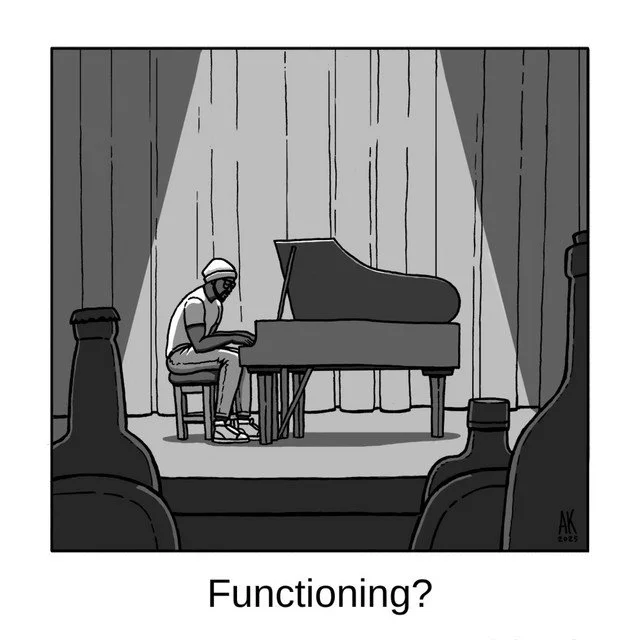iies Takes Listeners on a Genre-Bending Journey of Perspective with 'Don't Forget The Dot'
A soundscape like no other, "Don’t Forget The Dot" by iies pulses with a deeply intellectual groove that both stirs the soul and nudges the intellect. The album, brimming with eleven tracks of jazz-infused hip-hop and pop rap, feels like a sonic rendezvous between the abstract and tangible. Each complex track is not merely a musical offering but a layered narrative—an intricate interaction between sound and meaning, where genres are twisted and varied viewpoints revealed.
The album takes off with the swinging, rhythmic nostalgia of “Graffiti Swing. Rap’s bluntness bribes its way through a flirtatious dance with jazz. The hip-hop vibe with the drums is very deliberate and feels like it's inviting you to a corner of ancient Bronx lost in time, tagging walls while bebop whistles around. But midway, the beat shifts with a raplike intensity that elevates it to the anthem of staying alive. Deeply personal, it is a lyrical tour of inner-city living and introspective confessionals. Nodding to both Kendrick Lamar's complexity and the raw energy of street culture in general, "Graffiti Swing" gives a snapshot that suggests that even as chaos reigns around us there is still art—There’s beauty.
Meanwhile, Get Off Miie thwacks with a jazzier but more rapid beat. It's a heartbeat of a song, like it could go off the rails at any point, and yet there is an odd sense that this one moment was approached with careful precision. This is not a song you should just vibe to, it's way beyond that. A pent-up frustration, a fight between the artist's creativity and the standards of society that suffocate it. And the theme lyrics' in question bled into the mind of a rapper who was grappling with external forces. “Get off my / Aye / Get off my” doubles as both an anthem for and a desperate plea of sorts—a yearning (and at long last, liberation) from the pressure to perform.
Later down the line we get Junkyard, a cold minimalist masterclass in glacial spacey alt-pop, which gives off an air of early Tyler The Creator experimentation. And yet iies takes it even further, shedding extraneous accouterments to leave behind the bare essentials. And it is here that the album's themes of silence and broken voices are most acutely felt. That chorus is so direct, just screaming in your face (and by that I mean their own voices): "What if you don't use your voice // Add it to the junkyard" It is a hideous reminder of the fact that silence can be both, a weapon and also where dreams are laid to rest. The references to Palestine, genocide and the systemic erasure of history give it an unmistakable political edge - each line a stark reminder that there are uncomfortable truths we must be forced to contend with.
Then there is Follow, salve to the album's wounds. Its melodies are like things that rock you softly to sleep, or fill your heart with romance at the mere whisper of love. However, behind the softness hides a deep reflection on one's worth and faith. A promise of a kind, if that doesn't sound overbearing — an encouragement to let it take time and the rest will come. The love covered in this track is not just romantic; but self-love, community love and an entire people trying to be better. It is a song that becomes ontologically, “With each cycle of play,” the article reads, clearly much in expression to say and such an affront.”
Later into the album, Killian’s Descarga gets more energized with an urgency that can be felt. From that perspective it spans cosmic to earthy and back again finesse. It is raw, it is spiritual and it contemplates on the dichotomy of light over darkness — literally as well metaphorically. As with their two bulky chaps, the sonic palate mirrors this duality—somewhere between a mellow jazz standard and a rap cadence. This track is spiritual exultation, descarga — clean your soul with the sound.
The mood shifts with Moon Sign, as the album explores the sensual. A playful intimacy pervades one track, an ebb and flow of emotions both comfortingly familiar yet newly discovered. Celestial allusions—lunar signs, phases in the sky—serve as allegories for fluid bonds between people. It dwells in a lyrical exploration of togetherness, where fondness and vexation intermingle as planetary orbits do. And similar to Earth's sole satellite, the song exerts a magnetic pull, attracting listeners into its quiet yet potent orbit.
The penultimate track, Wings, is an ascension—sonically as well as thematically. Here iies demonstrates mastery in blending genres. The electric guitar hums like a far-off tempest, while the verses soar above chronicling a journey of self-acceptance and resilience. "Lessons learned / Finally earned wings" becomes a motto, a declaration that following all struggles, scars transformed into something lovely—wings to bear you above the tumult. It's triumphant, musically and emotionally, providing resolution that feels well-earned.
The album concludes with “Starlight” and its title track “Don't Forget The Dot”. These final songs feel like homecoming—a return to the central theme of perspective. In “Starlight”, an almost mystical aura imbues the music, seeming to shimmer with cosmic energy. It serves as a reminder that we all comprise something larger, that each note, each lyric, each life forms one piece of a greater constellation. “Don't Forget The Dot”, meanwhile, acts as a full-circle moment. The dot is not merely punctuation—it's a symbol of unity, a mark of conclusiveness that also signals fresh beginnings. The lyrics remind us perspectives matter, that every viewpoint, every dot, contributes to the larger picture.
By “Don't Forget The Dot,” you can see how it is not only intended as an album, but also planned to be more of an experience for listeners. A boundless soundscape of perspectives and meanings. A new sound by iies (pronounced eyes) unlike any you have ever heard before, made to not only challenge your ears, but the way in which one thinks and feels. It is a tribute to the value of working together, it inspires us that differences are beautiful and above all helps with just remembering points.



![[EP] — dwn bad Unveils Raw Vulnerability and Indie Rock Precision on Stirring Debut EP "Good Luck Have Fun"](https://images.squarespace-cdn.com/content/v1/5aa7771212b13fa2b4ca6cb5/1751972236718-PUP5RAALJHJJ8EVFW63D/dwnbad1-1749741634760+%281%29.jpg)



![[Album] — Jackson Breit Reimagines Musical Icons with Inventive Flair on Genre-Blending Masterpiece “Covers 2”](https://images.squarespace-cdn.com/content/v1/5aa7771212b13fa2b4ca6cb5/1751934890700-G7ZHDVKP5RBH4KRYODJD/Jackson+Breit+2.jpeg)
![[EP] - Rolla Blends Intricate Rhythms and Emotional Depth on Evocative Debut EP "Not Today Old Friend"](https://images.squarespace-cdn.com/content/v1/5aa7771212b13fa2b4ca6cb5/1752058095138-QJY16OJ47F86CAGAK1J0/rollas+%281%29.jpg)
![[Album] — Shayfer James Weaves Whimsy and Darkness into Lyrical Brilliance on Theatrical Indie Opus "Summoning"](https://images.squarespace-cdn.com/content/v1/5aa7771212b13fa2b4ca6cb5/1751853580941-S0EXN0W5WQ6XXXH8GXYX/shayferjames-summoning-3600px-1747957340999.jpg)

![[EP] - Darynka Melds Flesh and Futurism on Dazzling Electro-Concept EP “body.404”](https://images.squarespace-cdn.com/content/v1/5aa7771212b13fa2b4ca6cb5/1751842330924-R8UFC8N3BFKOOSAHPO07/2025-05-28-photo-w-laptop-1748490452689.jpg)







If a Lagos sunset could speak, it might slur its words with a grin and hum Shayo under its breath—half celebration, half confession. Dumomi The Jig’s latest Afrobeats offering is…